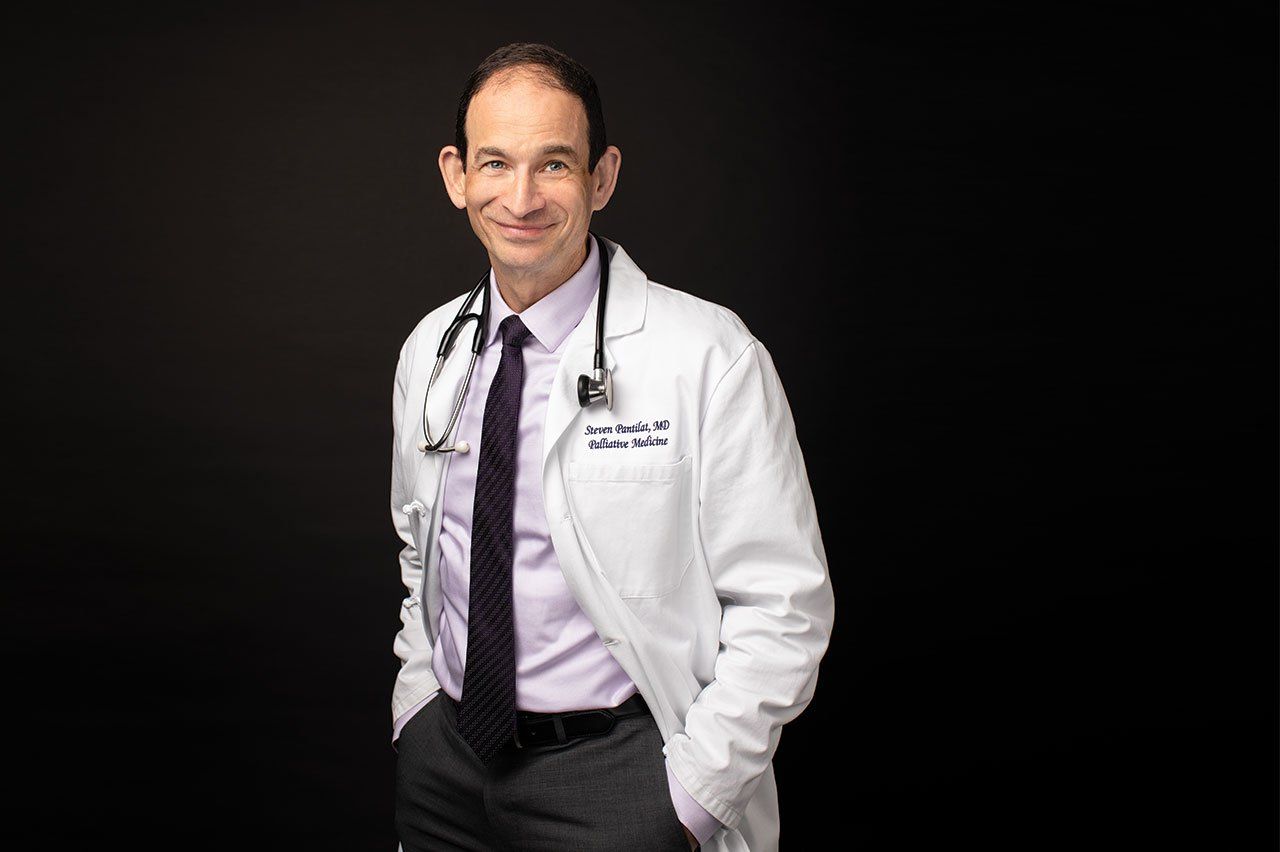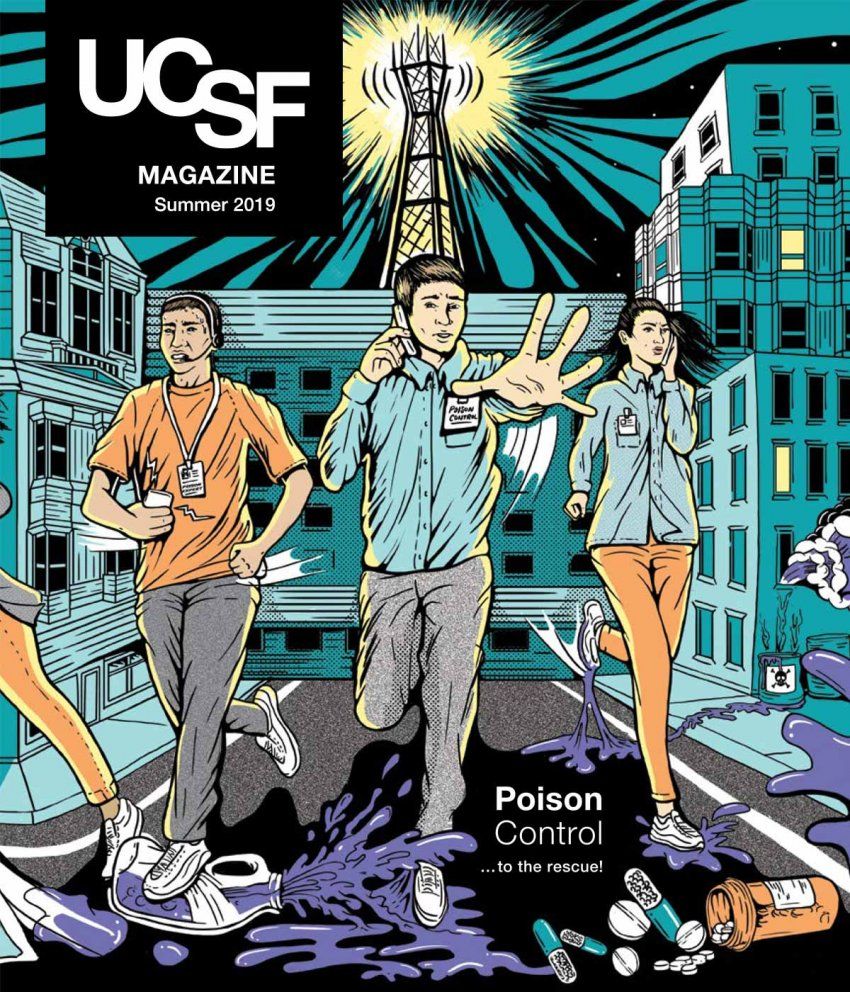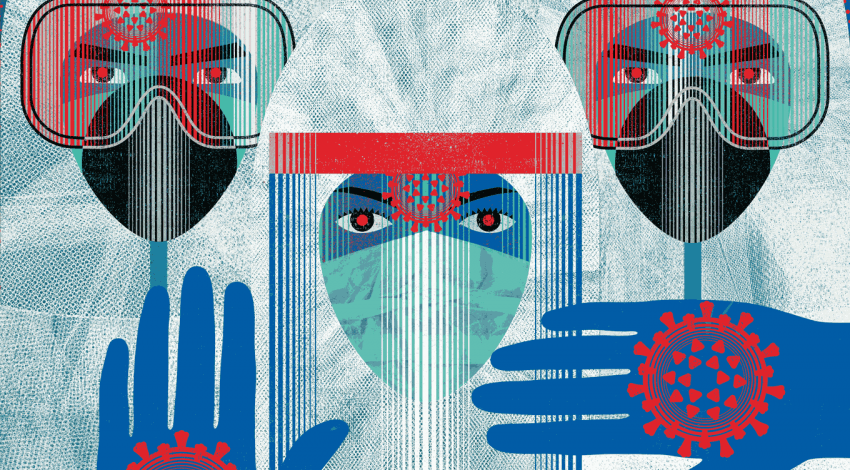
Palliative Care: It’s About Living, Not Dying
Q&A with Steven Pantilat, palliative care expert

Photo: Elena Zhukova
Steven Pantilat, MD ’89, is chief of UC San Francisco’s new Division of Palliative Medicine, an international expert in the field, and a lover of poetry that speaks to the heart. A line from a Mary Oliver poem inspires his work: “Tell me, what is it you plan to do / with your one wild and precious life?”
What is palliative care?
It’s medical care focused on improving the quality of life for people with serious illnesses. If you’re facing heart failure, cancer, dementia, ALS, or another such disease, we can help you live as well as possible for as long as possible. Palliative care is not about dying but, rather, about living.
Are there any other misconceptions?
That you have to choose between quality or quantity of life. Palliative care helps you have both. Much of what we do is talk with people about what values and goals they hold most dear. People care about many things in addition to a cure. Patients hope to be at a child’s wedding, for example, or visit their hometown one more time. We help them achieve the things that matter most to them – even while they’re receiving chemo, surgery, or other treatments. It’s not either/or.
What does palliative care involve?
A team of expert nurses, social workers, chaplains, and doctors work together to address all the issues that really matter to patients. I tell my patients, “You have an oncologist to take care of your cancer. Our focus is on you as a whole person: to relieve your symptoms; to help you make good decisions; to support you and your family emotionally, psychologically, practically, and spiritually.”
The People Behind Palliative Care
Nurses, social workers, chaplains, and doctors work together to help patients live well until the end. Palliative care requires resilience, compassion, honesty, and communication. We asked the people who power the field to share their thoughts.
Inspiring the best bedside care
“So much of palliative care happens at the bedside, with nurses,” says Susan Barbour, BS ’79, MS ’86, a clinical nurse specialist. Barbour and her colleagues have trained more than 500 UCSF nurses in how to manage symptoms and communicate effectively with those facing life-threatening illnesses. These nurses have gone on to champion palliative care in their units, and many have instigated projects to improve care. “It’s a grassroots effort,” she says. One of their human touches: Bereaved families from the ICU now receive a card signed by everyone who cared for their loved one.
Helping clinicians develop resiliency
Even the most dedicated clinician can experience burnout from the daily deluge of suffering and loss. Denah Joseph, an ordained Buddhist minister, trained psychotherapist, and palliative care chaplain at UCSF, teaches physicians and other caregivers how to be resilient. One of the most powerful ways, she says, is to develop “prosocial” skills – learning to cultivate awe, joy, appreciation, generosity, and compassion for oneself and others. “And community,” Joseph adds. “Sharing and talking is the number-one intervention for burnout. Connection is protection.”
Bolstering communication skills
“Health care professionals are trained to share a lot of information, but we are not trained to respond to emotions or talk about the big picture,” says Wendy Anderson, MD, a palliative care physician at UCSF. She’s also a faculty member at VitalTalk, a nonprofit that teaches evidence-based skills for communicating with the seriously ill. All kinds of practitioners – even longtime physician-leaders – are flocking to VitalTalk trainings, where they practice how to share serious news and tailor care plans to patients’ unique needs. Anderson says these tactics can help clinicians get to the heart of a matter quickly and answer the most important question of all: “What do I need to know about you as a person to best care for you?”
How is UCSF advancing the field?
Last year, we started one of the first divisions of palliative medicine in the country. We’ve trained teams from over 250 institutions. We’re leading a national network of 124 palliative care teams nationwide. We now have data on over 200,000 patient encounters that will help us research and improve care. We’ve come a long way, yet there’s still much for us to learn.
Why is demand growing, and how are you preparing?
Doctors and patients are increasingly recognizing the benefits of palliative care. People want care that helps them live as well as possible for as long as possible. Once people learn what palliative care is, they want it. So we’re training experts to meet this growing demand. We have one of the largest fellowship programs in the state, and we also train nursing students, medical students, and residents. We want all clinicians to know the basics of palliative care: how to manage pain, shortness of breath, and nausea and how to talk to patients about the things that matter most to them.
What have you learned from patients?
People appreciate honesty. It takes courage to face reality, but doing so can help people make the most of their time. Being diagnosed with a serious illness is devastating and can throw your life into chaos. But if we face the reality of the situation together, we can help people make good decisions about their care and make the most of their time. One of my patients had advanced lung disease and severe pneumonia but wanted to see her daughter get married – in 10 months in the Napa Valley. We didn’t give her false hope. We said, “You’ve got to do it now.” Three days later, her daughter came to the ICU in a beautiful wedding gown, her fiancé in a tuxedo. They pinned a corsage on the mom’s hospital gown. Our chaplain officiated. There wasn’t a dry eye. It was a beautiful wedding that she might otherwise have missed.
Is it tough to have these conversations?
We often find that patients feel great relief after having an honest, caring conversation about death and dying rather than skirting the issue. Which is not to say it isn’t sad. The patient is sad. The clinician is sad about having to give hard news. But people with serious illnesses have typically already thought about the possibility of dying – that’s what makes serious illness so scary. When it’s done with kindness and compassion, it’s often a relief. I tell patients it’s like being dealt a hand of cards. We can wish we had a better hand, but we have to do our best with the cards we have.
What helps you through the sadness?
The satisfaction of helping people, of making a difference. There are also moments of real joy, even amid the sadness. One of my patients just died, and his wife shared a letter our social worker helped him craft to his family. The last line is “My one regret is that I don’t know how Game of Thrones ended.” It is so sweet and sad. I now think of him every time I watch an episode.
Steven Pantilat is the Kates-Burnard and Hellman Distinguished Professor of Palliative Care.




